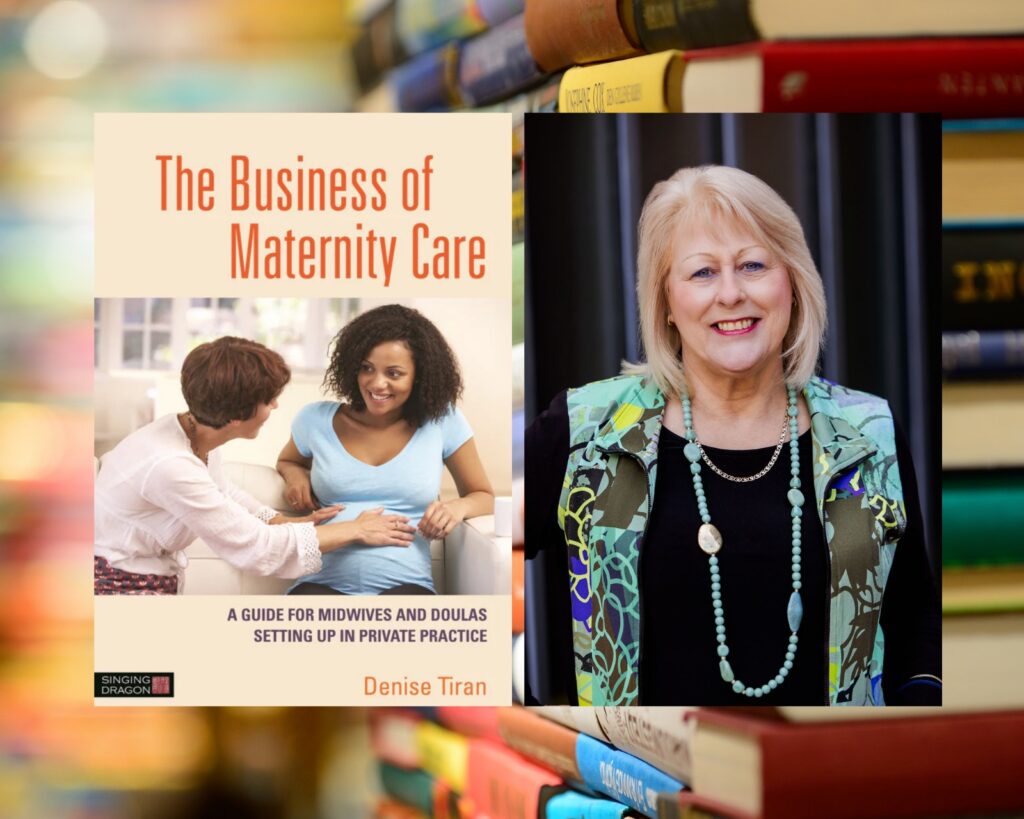Dr Denise Tiran HonDUniv FRCM is an international authority on complementary therapies (CTs), and offers unique courses for midwives on both CTs and on setting up in private practice. Here Denise identifies some questions that would-be entrepreneur midwives should ask themselves and gives her top tips for midwives preparing to go it alone.
_________________________________________________
My journey into business
Having taught at the University of Greenwich, London, for over 20 years, I recognised increasing numbers of women wanting to use Complementary Therapies (CTs) to resolve pregnancy and labour symptoms. However, there was no CTs education available for midwives, who were frequently faced with questions to which they did not know the answers.
In 2004, I decided to leave the University to set up a training organisation to fill the gap – and it was the scariest thing I have ever done. I was a single mother with a mortgage and a son at private school, giving up a significant salary as a prinicipal lecturer, so making this new venture a success was essential. There is nothing like being hungry to make you work at it!
Twenty years on and Expectancy is still going strong, offering short courses and longer academic programmes in CTs. Later, in response to midwives wanting to move into private practice, I have also offered business training and a licensing scheme (similar to a franchise) to help midwives take the leap into the commercial world.
Over the years, I have come across many enthusiastic midwives who have made costly mistakes in their fledgling businesses – not only financial mistakes and wasting money, but also professional and even legal errors. I made many blunders myself and wanted to help other midwives avoid the same mistakes.
Moving into self-employment is not for the faint-hearted. It is essential to acknowledge that setting up in private practice requires new knowledge and skills which are alien to midwives who have worked in the “free-at-the-point-of-contact” NHS where no money changes hands. This includes being aware of business regulations and laws, bookkeeping, marketing, pricing and other aspects that help a business to be successful.
So … if you’re wanting to work for yourself, here are some questions you should consider first:
- WHY do you want to establish your own business? Are you running towards working in a way that enables you to practise holistically, autonomously and with a better work-life balance? Or are you running away from the problems of your current work environment?
- WHAT services will you offer? Refine your skills so you can offer aspects of care that you enjoy, eg antenatal education, postnatal care, CTs for postdates pregnancy, moxibustion for breech, neonatal examinations, tongue tie division – or full independent birth services.
- WHO will be your target market? Will you work with anyone prepared to pay for your services or will you focus on one particular client group?
- WHEN do you want to work? Will you commit fully to your business or continue working part-time in the NHS? Will you work daytime, evenings or weekends?
- WHERE will you work? Will you hire a room in a clinic, use a room at home or become a mobile practitioner? Consider the pros and cons to find the option that suits you best.
- HOW do you want to work? Will you be a sole trader, balancing your income and expenses? Or will you register as a limited company to protect you financially if your plans don’t work out?
And finally, my top ten tips for getting started in your new venture:
- DO IT FOR THE RIGHT REASONS. Will this be your sole source of income – or is it simply a “hobby business”? Discuss your plans with family and friends for an objective view.
- RESEARCH CAREFULLY – https://www.gov.uk/browse/business is a good starting point, or my business book (Tiran 2019).
- THINK ABOUT THE MONEY – start saving now so you have funds to pay for setting up your business. Seek advice about registering with HMRC for self-assessment tax returns.
- DON’T RUSH! Don’t let enthusiasm overrule careful planning, or you risk making mistakes that could cost you money, clients, reputation, your NMC registration or legal charges.
- REMEMBER YOU’RE A MIDWIFE – Use the NMC Code to guide you. Separate private from NHS work. Ask NMC permission to use “midwife” or “midwifery” in your business name.
- GET INSURED – professional indemnity insurance to protect your clinical practice is a legal requirement; public liabiity is optional but advisable to protect working premises.
- LOOK PROFESSIONAL, not amateurish – outsource what you can’t do yourself eg website, logo design. Remember – you only have one chance to make a first impression!
- START SMALL – Don’t attempt to offer everything all at once – start with two or three main services to gain experience; you can add others as you progress.
- DON’T BE AFRAID TO SAY “NO” – Think about who you will and will not accept as clients – and consider potential conflicts of interest that may affect this decision.
- VALUE YOURSELF! Never, ever undersell yourself or your services. You want clients but pricing your fees too low will not bring you more money – and may lead to losing income.
So, do you think you have what it takes to go it alone? If you’re seriously considering setting up in private practice to offer midwifery-related clinical services, it is worth exploring your options.
If you’re keen to help families achieve a rewarding pregnancy and birth experience, think about what you can offer them and how you can gain a more fulfilling working life.
Trust in your skills, knowledge and experience. And most of all, value your abililties to make it a success. As they say in the advert – “you’re worth it”!
Further reading:
- Nursing and Midwifery Council 2018 The Code: Professional standards of practice and behaviour for nurses, midwives and nursing associates https://www.nmc.org.uk/standards/code/
- Tiran D 2019 The Business of Maternity Care: a guide for midwives setting up in private practice. Singing Dragon, London.

Any questions? Contact Denise on info@expectancy.co.uk for advice on your career plans and information on business training.
Dr Denise Tiran HonDUniv FRCM
CEO / Education Director, Expectancy
Email: info@expectancy.co.uk Telephone: 07956 235456
June 2025



1 comment
Brilliant!!
I would advise any midwife who wants to consider using complementary therapies as part of your repetoire to train with Expectancy amd Denise Tiran – she is the best and understands it all from a midwife’s perspective and teaches you how to work and offer complementary therapies safely as a registered midwife.
Best time and money I’ve spend – was training with Expectancy.
Comments are closed.